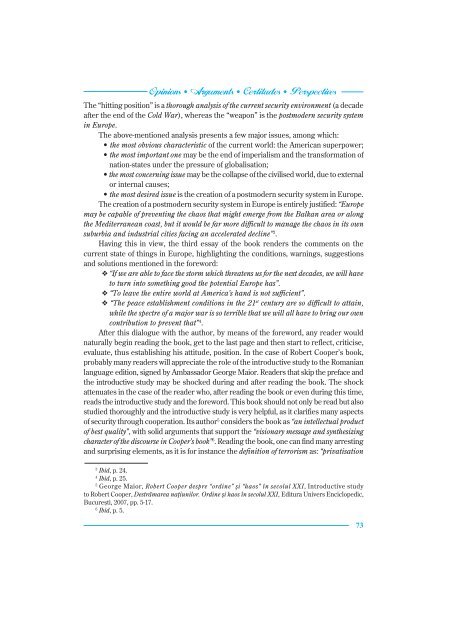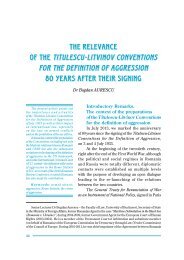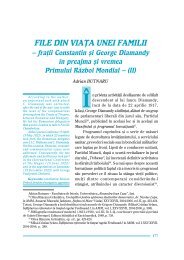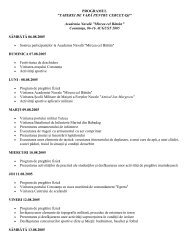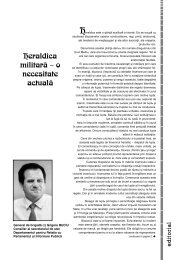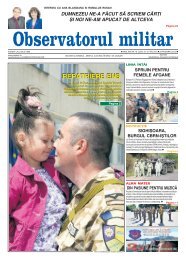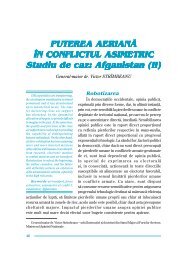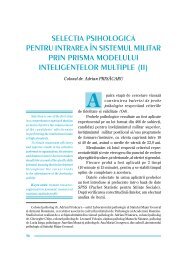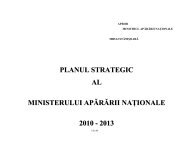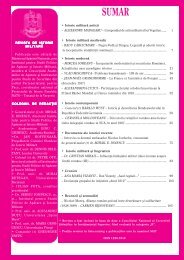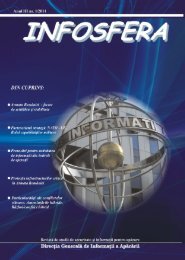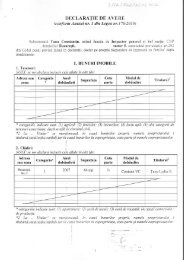Romanian Military Thinking
Romanian Military Thinking
Romanian Military Thinking
You also want an ePaper? Increase the reach of your titles
YUMPU automatically turns print PDFs into web optimized ePapers that Google loves.
Opinions • Arguments • Certitudes • Perspectives<br />
The “hitting position” is a thorough analysis of the current security environment (a decade<br />
after the end of the Cold War), whereas the “weapon” is the postmodern security system<br />
in Europe.<br />
The above-mentioned analysis presents a few major issues, among which:<br />
• the most obvious characteristic of the current world: the American superpower;<br />
• the most important one may be the end of imperialism and the transformation of<br />
nation-states under the pressure of globalisation;<br />
• the most concerning issue may be the collapse of the civilised world, due to external<br />
or internal causes;<br />
• the most desired issue is the creation of a postmodern security system in Europe.<br />
The creation of a postmodern security system in Europe is entirely justified: “Europe<br />
may be capable of preventing the chaos that might emerge from the Balkan area or along<br />
the Mediterranean coast, but it would be far more difficult to manage the chaos in its own<br />
suburbia and industrial cities facing an accelerated decline” 3 .<br />
Having this in view, the third essay of the book renders the comments on the<br />
current state of things in Europe, highlighting the conditions, warnings, suggestions<br />
and solutions mentioned in the foreword:<br />
“If we are able to face the storm which threatens us for the next decades, we will have<br />
to turn into something good the potential Europe has”.<br />
“To leave the entire world at America’s hand is not sufficient”.<br />
“The peace establishment conditions in the 21 st century are so difficult to attain,<br />
while the spectre of a major war is so terrible that we will all have to bring our own<br />
contribution to prevent that” 4 .<br />
After this dialogue with the author, by means of the foreword, any reader would<br />
naturally begin reading the book, get to the last page and then start to reflect, criticise,<br />
evaluate, thus establishing his attitude, position. In the case of Robert Cooper’s book,<br />
probably many readers will appreciate the role of the introductive study to the <strong>Romanian</strong><br />
language edition, signed by Ambassador George Maior. Readers that skip the preface and<br />
the introductive study may be shocked during and after reading the book. The shock<br />
attenuates in the case of the reader who, after reading the book or even during this time,<br />
reads the introductive study and the foreword. This book should not only be read but also<br />
studied thoroughly and the introductive study is very helpful, as it clarifies many aspects<br />
of security through cooperation. Its author 5 considers the book as “an intellectual product<br />
of best quality”, with solid arguments that support the “visionary message and synthesizing<br />
character of the discourse in Cooper’s book” 6 . Reading the book, one can find many arresting<br />
and surprising elements, as it is for instance the definition of terrorism as: “privatisation<br />
3 Ibid, p. 24.<br />
4 Ibid, p. 25.<br />
5 George Maior, Robert Cooper despre “ordine” [i “haos” în secolul XXI, Introductive study<br />
to Robert Cooper, Destr`marea na]iunilor. Ordine [i haos în secolul XXI, Editura Univers Enciclopedic,<br />
Bucure[ti, 2007, pp. 5-17.<br />
6 Ibid, p. 5.<br />
73


